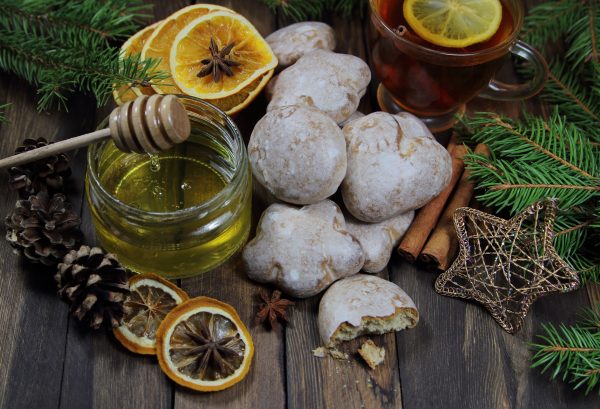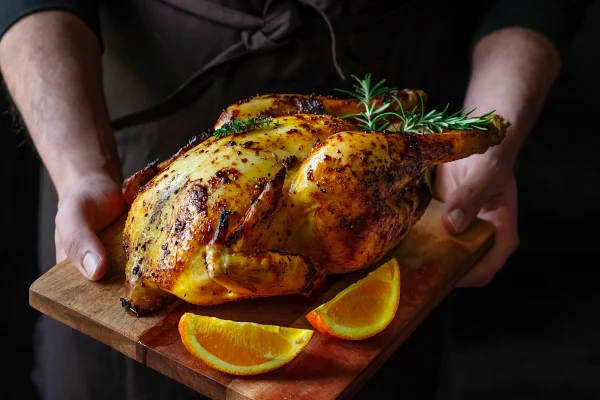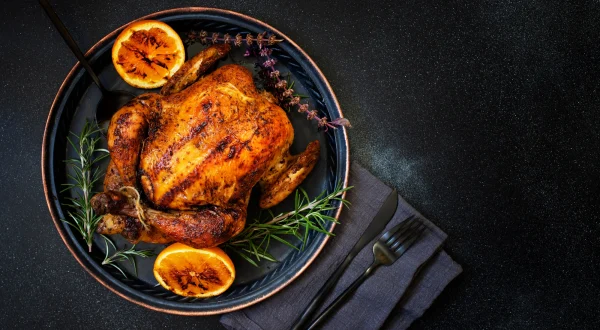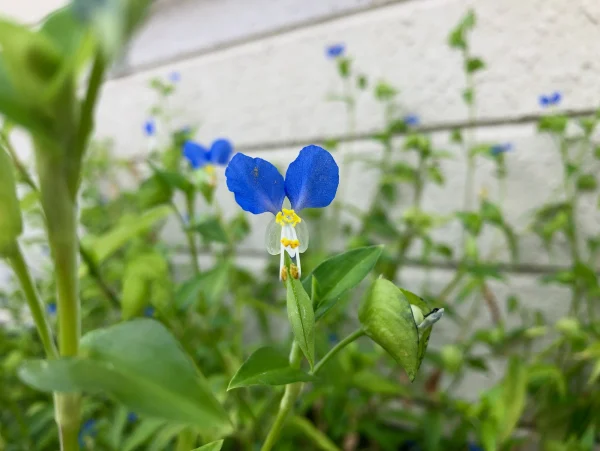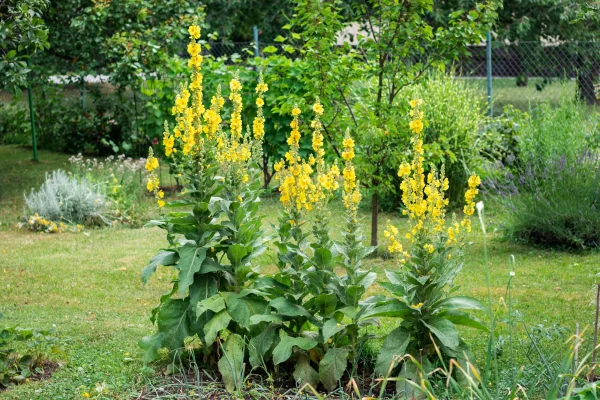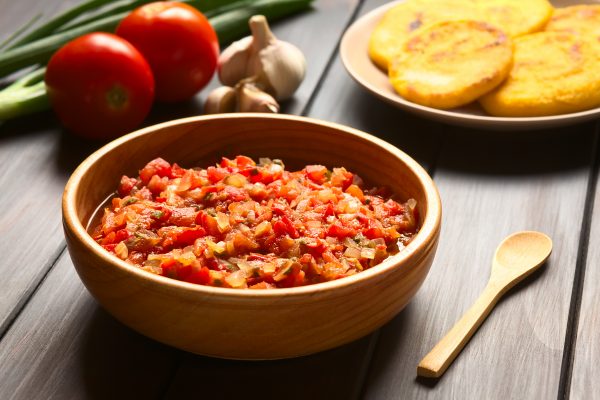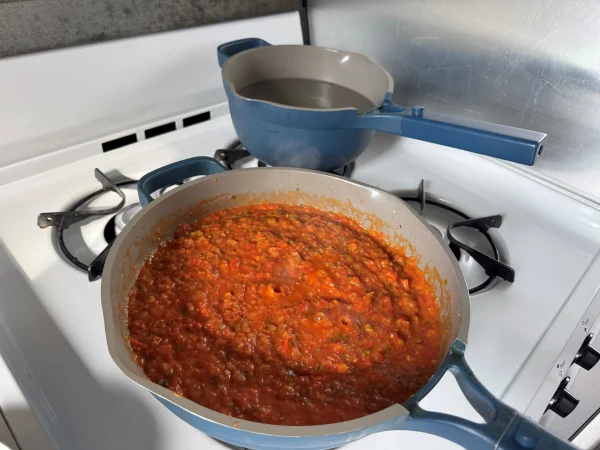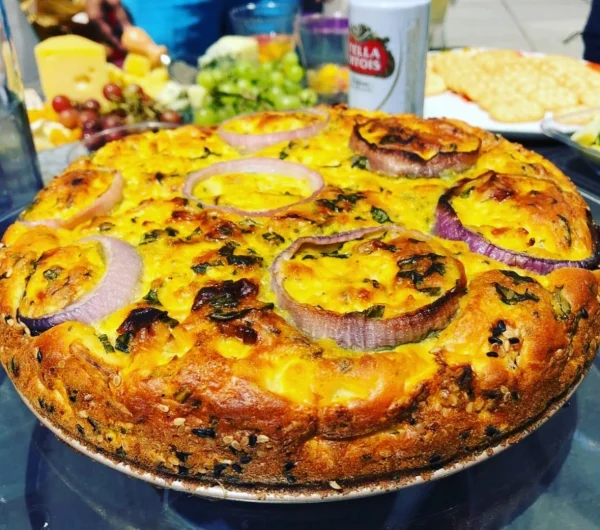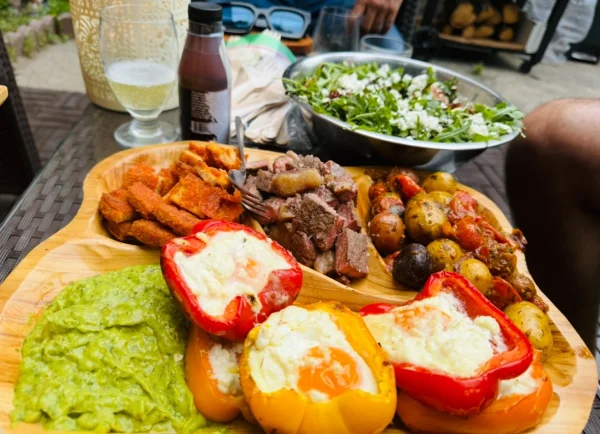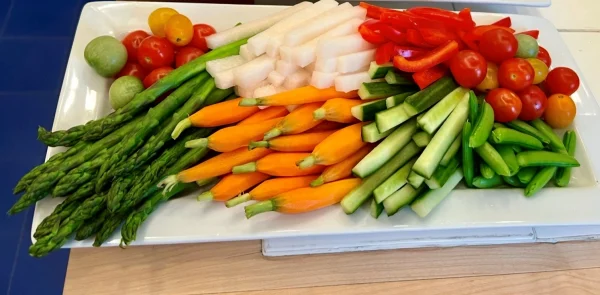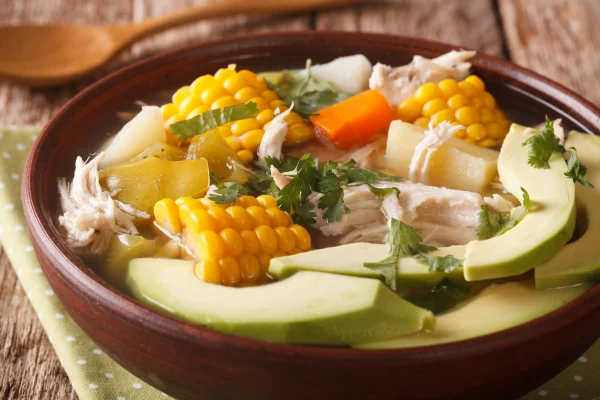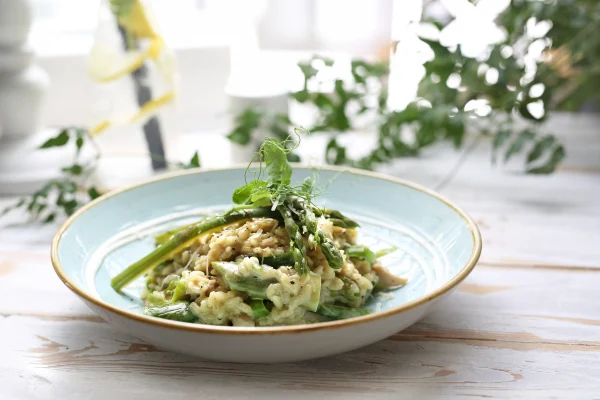
Open House New York Open City Benefit | Hosted at GLDG 303 in the Brooklyn Navy Yard | Menu by Great Performances | Senior Event Director Morgan Golumbuk
Our founder, Liz, has been on the board of Open House New York since 2020, and I have been lucky enough to partner with them on two of their annual events (the Open City Benefit in the spring and the OHNY Weekend Launch Party in the fall) since the following year.
This year’s Open City Benefit was held at BLDG 303 in the Brooklyn Navy Yard and brought together 400 design and civic leaders in a celebration of the power of place and new possibilities for our city. We called on our Culinary Director, Andrew Smith, to curate a highly seasonal family style menu and partnered with Kings County Distillery to serve a delicious, classic Penicillin cocktail at the bar.
From the initial walkthrough in December to the event in April, we collaborated with the Open House New York team to bring their vision to life. They continue to open doors for New Yorkers, and we will always be ready to feed them.
Open City Benefit Dinner Menu
- Honeyed Mixed Nuts* [VT, CN]
- Root Vegetable Chips* [VEGAN]
- Carrot Mousse Tart with Candied Fennel Seeds, Celery Sprouts [VEGAN]
- Peruvian Potato Cup with Comte Fondue [GF, VT]
- Tamari Ginger Tuna Poke with Crisp Sesame Tuile [GF,DF]
- Whitefish Salad on Crispy Grits with Dill, Radish [GF]
- Chicken & Waffle with Black Pepper Honey, Fried Rosemary
- Korean Chicken Bite with Gochujang Fried Chicken, Kimchi Slaw, Cilantro & Sriracha Aioli
- Grilled Chicken and Strawberries with Burnt Strawberry Chutney [GF]
- Citrus Grilled Branzino [DF, GF]
- Fava Beans with Young Pecorino Cheese, Affilla Cress, Lemon Mint Vinaigrette [GF, VT]
- Roasted Baby Beets with Brown Butter [GF, VT]
- Red Bliss New Potato Salad [VEGAN, GF]
- Hen of the Woods Mushrooms & Chiffonade Kale with Frisee, White Balsamic Vinaigrette & Garlic Blossom [GF, VEGAN]
- Great Performances Signature Bread Basket with Multigrain Rolls, Pretzel Baguettes, Mini Baguettes, Olive Rolls, & Local Butter with Sea Salt
- Caramel Cheesecake Bites
Carrot Ginger Squares [VEGAN,GF] - Dark Chocolate-Raspberry Truffles [VEGAN,GF]
- Dirty Chai Tartlet with Chai Custard, Coffee Whipped Cream
- Funfetti Cake Bite with Colorful Sprinkles
- Lemon Basil Madeleine with White Chocolate & Micro Basil [VEGAN,GF]
- Kings County Distillery Peated Bourbon, Ginger-Honey Syrup, Fresh Lemon Juice, Lemon Twist
About Chefs’ Choir®
A chorus of culinary voices from Great Performances—our chefs step out of the kitchen to share recipes, stories, and inspiration. Learn more →
Chef Michael Steifman shares a mouth-watering recipe for smokey, savory, sweet, and tangy St. Louis Ribs. This is a delicious recipe that does involve several steps, but we think it’s well worth it. These are a guaranteed crowd pleaser (and we wouldn’t blame you if you made a couple extra ribs for a rainy day).
Everything can be prepared in advance, saving time and effort the day of your event, but we love the magic of preparing these in the morning to serve straight from the grill to the plate. Perfect for lunch or dinner, we like them paired with classic barbecue favorites of grilled corn on the cob and a fresh salad.
St. Louis Smoked Pork Ribs
by Chef Michael Steifman
Serves 2-4
Ingredients
55 grams kosher salt
5 grams black pepper
10 grams chili powder
5 grams smoked paprika
2 grams coriander
10 grams mustard powder
3 grams cumin powder
18 grams onion powder
16 grams garlic powder
2 grams coffee granules
10 grams activated charcoal
Procedure
- Mix all ingredients in a bowl until evenly combined.
- If not using immediately, place in an air tight container and store in a cool, dry, dark place until ready to use.
Ingredients
7 pounds ketchup
1/2 Spanish onion, minced or pureed
1 pint black coffee (brewed)
1 pint apple juice
1 pint cider vinegar
1/2 pint soy sauce
1/8 cup chipotle puree
1 pound dark brown sugar
1 Tbsp smoked paprika
1 cup Urfa Biber
Procedure
- Combine all ingredients, except ketchup in a pot.
- Bring to a boil and stir to make sure all ingredients are combined and solids dont stick to the bottom.
- Reduce heat to a low and simmer for 30-45 minutes until liquid is reduced by half.
- Add the ketchup and whisk until completely combined.
- Keep heat on low and let simmer very lightly for another 30 minutes.
- Let cool to room temp, then refrigerate.
Ingredients
450g (1 Rack) St. Louis Ribs
30g (2tbsp) Black Rub
200g Bitchin’ BBQ Sauce
Procedure
- Clean ribs and remove membrane from backside
- Rub ribs with black rub
- Set smoker to 225 degrees and cook ribs for 2 hours
- Remove ribs from smoker, sprinkle with the brown sugar and wrap tightly in aluminum foil, then return to smoker for 1 hour.
- Remove ribs from smoker and remove foil
- Baste ribs with bbq sauce and return to smoker for 15 minutes
- Repeat step 6 every 15 minutes until ribs are done
Father’s Day has never been a big event in my world. In a family of chefs, holidays often mean longer hours, not less. While others celebrate with barbecues and backyard toasts, we’re usually in the thick of a brunch rush, slicing, sautéing, plating. That’s just the life. But this year was different—this year, I became a father.
Our daughter, Mila, arrived like a spark in the middle of our non-stop, kitchen-bound lives. She’s tiny, but she’s changed everything. It’s not just that I see things differently now; it’s that I feel time differently. I used to measure my days in staff lists and event timing. Now I think about first smiles, bath times, and tiny socks.
On this first Father’s Day, the kitchen was still busy. We were still juggling knives and timers, still shouting “Behind!” and “No Thumbs on the plates!” But somehow, amidst the noise and the rhythm of service, there was a new kind of joy—a quiet one. I looked over at my family, all of us chefs, all of us bound together by something more than food now. And later, when I held Mila in my arms—just for a few minutes before the next task—I felt it: gratitude. Deep, slow-burning gratitude for the love in this fast-paced life.
We don’t usually stop for holidays. But Mila is teaching me that sometimes, even a moment is enough.
About Chefs’ Choir®
A chorus of culinary voices from Great Performances—our chefs step out of the kitchen to share recipes, stories, and inspiration. Learn more →
Chefs Anastassia Batsoula-Deuel and Mike Deuel love grilling vegetables in their back yard — and we suspect that as the growing season kicks off, they’ll be grilling a lot of their own produce! This powerhouse chef couple met while working at GP, and it’s one of our favorite GP love stories! The recently welcomed their daughter, Mila, to the family and we couldn’t be more delighted.
Here they share a recipe for Whole Grilled Cabbage with Garlic Butter & Chili Crisp – a perfect celebration of one of our favorite brassicae. The savory, spicy butter sauce is a delightful complement to the smokey, naturally sweet cabbage and is a sleeper hit at any occasion. Serve as the centerpiece to a meal or as a delectable side dish. We’re pretty sure you there won’t be any leftovers with this dish!
Cooking Whole Vegetables Over Fire: Our Favorite Way to BBQ as a Household of Chefs
We’ve worked in a lot of kitchens over the years—some bustling and loud, some calm and rustic—but our favorite kitchen is still the one in our backyard. There’s something grounding about stepping outside with a glass of something cold, firing up the grill, and cooking with simple, seasonal ingredients. And lately, our favorite way to cook is with big, bold vegetables, straight on the coals.
Whole cabbages, butternut squash halves, giant potatoes—we love how these humble ingredients transform over fire. They don’t ask for much. A little oil, some seasoning, and time. What you get in return is flavor that’s smoky, sweet, a little charred at the edges, and deeply satisfying.
We started grilling whole vegetables out of curiosity and ended up falling in love with the ritual. Cabbage became a star in our home—soft in the middle, smoky outside, with enough structure to slice into wedges like a roast. There’s a kind of magic that happens when you let the fire do its thing.
Here’s one of our go-to recipes, usually made while our daughter picks herbs from the garden and our dog lurks hopefully near the grill.
Grilled Whole Cabbage with Garlic Butter & Chili Crisp
by Chef Anastassia Batsoula-Deuel and Chef Mike Deuel
Serves 2-4
Ingredients
- 1 whole cabbage (we like green or savoy)
- Olive oil
- Kosher salt & freshly ground black pepper
- 4 tbsp unsalted butter
- 2 cloves garlic, minced
- 1–2 tbsp chili crisp (we don’t fight over this—we just add more)
- Optional: a splash of soy sauce or lemon juice for brightness
Procedure
- Prep Together We trim the cabbage, keeping the core intact so it stays together. Then rub it with olive oil, salt, and pepper. One of us handles the cabbage; the other pours the wine.
- Wrap & Roast Wrap the cabbage in foil—tight like a gift—and place it over indirect heat on the grill (around 375°F). We close the lid and let it roast for about an hour, rotating now and then.
- Char It Unwrap the cabbage and place it directly over the flames for 5–10 minutes. That charred outer layer? Don’t fear it. That’s flavor.
- Make Garlic Butter While one grills, the other melts butter in a small pan, adds garlic, then stirs in chili crisp. Sometimes we add soy sauce or lemon—depends on our mood.
BBQing whole vegetables has become a small, shared ritual for us. No timers, no plating stress—just the joy of watching something transform, together. And we’ll be honest: this cabbage recipe has quietly stolen the show at more than one cookout.
More Recipes by Chef Anastassia Batsoula-Deuel and Chef Mike Deuel
About Chefs’ Choir®
A chorus of culinary voices from Great Performances—our chefs step out of the kitchen to share recipes, stories, and inspiration. Learn more →
This month, Chef Tatiana Iglesias shares a delicious recipe perfect for an outdoor brunch or breakfast for dinner: Grilled Eggs in Bell Peppers with Guacamole. The sweet bell peppers pick up a savory smokiness from the grill, and are the perfect vessel for grilled eggs. You can easily adjust this recipe for however many people will gather around the table, and it’s a great addition to any brunch spread. Chef Tatiana’s brunch options included grilled steak, roasted baby potatoes with cherry tomatoes and garlic, arugula salad with radishes and goat cheese, and a vegan breaded chik’n cutlet.
One of the reasons I love summer so much is because it gives me an excuse to grill as often as possible. There’s something really special about gathering with friends and family, enjoying the outdoors, and sharing a meal made with love. That simple act of being together, with good food and free time, brings me so much joy.
Grilling is more than a cooking method to me; it’s a way to slow down, connect, and savor the moment. And one of my favorite simple grilling recipes is these grilled bell peppers filled with eggs. They’re fresh, fun, and perfect for a weekend brunch or casual summer get-together.
Grilled Eggs in Bell Peppers with Guacamole
by Chef Tatiana Iglesias
Serves 2-4
Ingredients
- 2 large bell peppers, halved lengthwise and seeds removed
- 4 eggs
- Olive oil
- Salt and pepper
- Optional toppings: chopped scallions, chili flakes, fresh herbs
For the Guacamole
- 2 ripe avocados
- Juice of 1 lime
- 1 small clove of garlic, finely grated or minced
- Salt
- Optional: chopped cilantro, diced tomato, minced jalapeno
Procedure
- Preheat your grill to medium heat
- Lightly brush the outside of the bell pepper halves with olive oil and place them on the grill, cut side up
- Carefully crack one egg into each pepper half. Close the lid and grill for 10-12 minutes, or until the whites are set and the yolks are cooked to your liking.
- While the peppers are grilling, prepare the guacamole. Mash the avocados with lime juice, garlic, and salt. Add any optional mix-ins you like.
- Serve the grilled eggs hot, with a generous scoop of guacamole on the side.
A 20-Course Cinematic Dinner for G20
Menu by Great Performances | Hosted at Shift Midtown | Concept by THREE20
As part of a three-day celebration leading up to the New York City premiere of Amazon Studios’ G20, the creative team at THREE20 envisioned an immersive experience that would bring together culture, community, and cinematic storytelling. One of the centerpieces of the weekend: a 20-course interactive dinner designed to echo the emotional rhythm of the film.
With just one week to develop the menu, Great Performances—led by Culinary Director Andrew Smith and Senior Event Director Gary Bedigan—designed a five-act culinary journey, with four courses per act. Each phase of the meal was crafted to align with the evolving tone and visuals of the evening, supporting a fully immersive, multi-sensory experience.
Shift Midtown, the host venue, provided the perfect backdrop for THREE20’s vision, transforming the space with projection mapping and live performance. Walls, tables, and plates became dynamic storytelling surfaces. Actors moved through the room. Guests were transported into a world where fiction, film, and food collided.
From the first bite to the final scene, the dinner played a central role in the evening’s narrative—a seamless collaboration between visual storytelling, live performance, and culinary creativity.
We were honored to support THREE20’s bold concept and help bring one of the most memorable moments of the G20 premiere to life.
The Menu
COURSE ONE
- Diplomatic Immunity – Compressed Strawberry, Yuzu Tamari, Kaluga Caviar, Micro Shiso
COURSE TWO
- Opening Statement – Asparagus, Micro Greens, Herb Cream, Flowers
COURSE THREE
- Global Alliance – Beef Carpaccio, Thai Sunflower Chicken Satay, Souvlaki Vegetable Skewer
COURSE FOUR – Beverage
- Red Carpet Toast – Prosecco, St. Germain, Rose, Watermelon
COURSE FIVE
- Breach Detected – Smoked Wild Mushroom Tea
COURSE SIX
- Encrypted Message – Carrot Flan, Cured Egg, Hidden Message Rice Crisp
COURSE SEVEN – Beverage
- Power Play – Vodka, St. Germain, Lime, Honey, Jalapeno Agave Cream
COURSE EIGHT – Palate Cleanser
- Red Alert – Lemon Sorbet, Electric Mango Powder
COURSE NINE – Beverage
- Truth Serum – Three-Layer Shot, Green Juice, Tomato Water, Nasturtium, Gin Dropper
COURSE TEN
- The Lie Detector – Foie Gras Toast, Brioche, Concord Grape, Pistachios, Milk Chocolate Ganache Toast, Brioche, Concord Grape, Pistachios
COURSE ELEVEN
- Deep Fake Dessert – Savory Tart Shell, Salmon Tartare, Beet Cream, Lemon Pepper Pearls
COURSE TWELVE
- Blackout File – Vegetable Ash Risotto, Pitch Black Parmesan Frico
COURSE THIRTEEN
- Code Red – Torched Mackerel, Carrot Wakame, Ninja Radish
COURSE FOURTEEN
- Collateral Damage – Slow Poached Arctic Char, Crème Fraiche, Chili Oil, Green Oil, Salmon Roe
COURSE FIFTEEN
- The Beast Bite – A-5 Wagyu, Smashed Potato, Truffle Demi
COURSE SIXTEEN – Beverage
- Restart Sequence – Espresso Martini
COURSE SEVENTEEN
- Rebuild the Summit – Strawberry Shortcake, Vanilla Sponge, Vanilla Chantilly, Strawberry-Rose Compote
COURSE EIGHTEEN
- Presidential Decree – Milk Chocolate Dipped Grissini, White Chocolate Drizzle, Rice Paper Message
COURSE NINETEEN – Beverage
- State of the Union – Delicate Cocktail
COURSE TWENTY
- Classified Ending – Chocolate Dome, Espresso Cream, Dark Chocolate Truffle
We’re thrilled to announce the opening of Clara Restaurant at The New York Historical. The newest addition to the Great Performances family, it’s a long-awaited collaboration between some of our most valued partners.
Clara Restaurant is the result of a dynamic partnership between Great Performances, The New York Historical, and celebrated chefs Alex Guarnaschelli and Michael Jenkins. As part of our exclusive hospitality partnership with The New York Historical, GP operates both Clara Restaurant and the Cafe, bringing elevated dining to one of the city’s most iconic cultural institutions.
Working with Food Network star Alex Guarnaschelli—a longtime friend of GP—and Chef Michael Jenkins on this project has been a flavorful collaboration born from a shared love of food and hospitality. Their creative vision and culinary talent have brought Clara to life in a way that beautifully reflects the restaurant’s setting and story.
Located on the lower level of The New York Historical, Clara is a warm, modern American restaurant with a menu inspired by the rhythm of the seasons. The menu is built around ingredients sourced from local green markets and our very own Katchkie Farm, ensuring every dish reflects the bounty of the region with freshness and intention.
Guests can expect vibrant vegetables, responsibly sourced proteins, and thoughtful preparations that let the ingredients shine. The dessert menu offers a unique twist: a different homemade cake each day, showcasing classic techniques and seasonal flavors with a touch of surprise.
Named in honor of Clara Driscoll, the brilliant designer behind many of Tiffany Studios’ most iconic stained-glass works, the restaurant embodies both artistry and elegance—a perfect match for tis home within New York’s first museum.
We’re incredibly proud of this new chapter and invite you to join us at Clara!
Visit Clara Restaurant to learn more and make a reservation.
We hear organizations across industries talk about “curating the next generation”. But what exactly does that mean?
For Jazz at Lincoln Center, that means music education from a child’s earliest days before they can walk with Wee Bop, all the way through high school and beyond. This year, Jazz’ signature education program Essentially Ellington is celebrating 30 years of outstanding high school bands welcoming 30 high school bands from around the country.
For Great Performances, it’s a unique opportunity to peak into the most innovative jazz education programs in the world. For 5 days, these students are immersed in workshops, jam sessions, rehearsals and performances in the House of Swing, Frederick P Rose Hall.
But by far, our favorite event of the weekend is the opening night dinner. On Wednesday night, we will serve over 700 students from 30 high school bands. While our menu might not seem as sophisticated as a black-tie gala, the food is nonetheless made with love, encouraging these talented teenagers a chance to break bread together. We serve a comforting family style meal of chicken, salads, mac and cheese and of course entirely nut-free desserts.
The magical Appel Room, with its glorious city views, becomes home to the students’ first night in NYC. The wows are overwhelming. The seating arrangements for the students are arranged by the musical instruments they play, giving the students instant bonding connections. Our waitstaff become “ice breaker” hosts, like camp counselors, helping to introduce sometimes shy students to each other, find out where they are from and what instrument they play. By the end of the dinner the students have formed lifelong bonds, and lucky for us… we get to witness the future Jazz musicians in the earliest days of their budding careers with high energy jam sessions!
Click here to view the full festival schedule, see this year’s finalist bands, stream all events leading up to the final concert, and purchase tickets to the finale at Metropolitan Opera House featuring top student ensembles and the Jazz at Lincoln Center Orchestra with Wynton Marsalis.
Check out these heartwarming videos from last year’s post-dinner jam sessions. Good luck to all 30 schools competing and congratulations to Jazz on celebrating 30 years of EE!
Essentially Ellington Family Style Dinner
- BBQ Chicken
- Mac & Cheese
- Fontina, Gruyere, White Cheddar
- Fingerling Potato Salad
- Grilled Leeks, Red Pepper & Frisee
- Garden Salad
- Spinach, Romaine, Cucumbers, Red & Yellow Peppers, Cherry Tomatoes, Balsamic Vinaigrette
- S’mores Squares
- Vegan Miniature Chocolate Chip Cookies
The Cambridge Dictionary defines the word “relationship” as “the way two things are connected.” There is no better example of this is than our 21 year relationship with Time Magazine, which has certainly withstood the test of time.
We have just had the privilege of catering the iconic Time 100 Gala this past April at the most extraordinary venue in NYC: Jazz at Lincoln Center (where we recently celebrated our 20th year as their exclusive catering and hospitality partner.) This is one of the most exciting events we cater annually as it reflects world culture, politics, and the arts, bringing everyone together for one night. We’ve had the honor of catering every Time 100 Gala since its inception 20+ years ago.
Much has changed in the past two decades, but one thing remains . . . Great Performances’ exceptional ability to adjust with the times.
Our dedication to “being of service” is one of the guiding principles behind our success. We never lose sight of how incredibly lucky we are to be able to play a role and work tirelessly to assist Time host the most unique event of the year. Events of this magnitude come with their own difficulties and the way we navigate these by working on solutions rather than just “saying no” is, in our opinion, one of the main reasons that companies like Time keep coming back to JALC and to us.
It’s never about taking credit; it’s about creating moments and an experience that make our clients feel seen, heard, and exceptionally cared for. Over our forty-five-year career in New York, we have developed many event partnerships such as ours with Time and look forward to many more years of being there when only the best is good enough.
Maya Angelou said it best. “I’ve learned that people will forget what you said, people will forget what you did, but people will never forget how you made them feel.”
Here’s a recipe my mom always makes. It’s tasty, healthy, vegan and beautiful on the table.
Russian Vinaigrette, we call Vinegret, is a classic Russian salad featuring diced cooked beets, potatoes, carrots, pickles,sweet peas, scallions and dill. Dressed with a simple seasoning of oil, salt and pepper. It’s on the table of most family holidays. Always made by my mom. Best made the day before so the beets have time to release their color.
Ingredients
- 5 medium beets
- 3 medium carrots
- 3 medium potatoes
- 4-5 pickles
- 1 can sweet peas, drained
- 1 bunch scallions
- 1/4 bunch Dill
- Oil of your choosing
- Salt & Pepper to taste
Procedure
- In a medium pot boil beets for about 1 hour or until they are tender.
- In a separate pot, boil whole potatoes and carrots in their skins for about 30 minutes or until a knife goes in smoothly.
- Drain the vegetables and let them cool to room temp.
- Peel the skins from the potatoes, beets and carrots, easiest to do with a pairing knife. Dice the beets, potatoes, carrots and pickles into a big bowl.
- Mix everything together, adding scallion, dill, oil, salt, pepper and vinegar(if using) to taste. Refrigerate until ready to eat, tasting once more for seasoning before serving.








